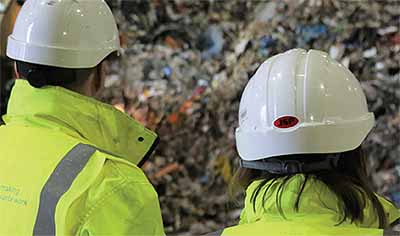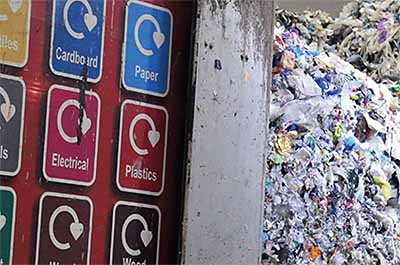UK Waste Solutions Ltd
Engaging waste solutions
In truly idealistic fashion, the formation of UK Waste Solutions Ltd (UKWSL) was driven by its founders’ inspirational belief that they can introduce new ways to solve old challenges in the British waste management industry. Chris Giscombe and Garry Johnson started the business in December 2003, on the back of the extensive experience they had garnered in the years leading up to that moment, centring on the development of customer excellence, which, over time, would become a key driver of success for UKWSL.
As we wanted to learn more about the reasons behind the company’s substantial growth in the past five years, which saw it increase its annual turnover from £8 million to £30 million, we  got in touch with UKWSL’s Managing Director, Max Kanda, who happily took us through the business’ history, core values, working methods, and recent developments.
got in touch with UKWSL’s Managing Director, Max Kanda, who happily took us through the business’ history, core values, working methods, and recent developments.
“It took us just two years to land our first major national waste management contract with TUI and as the business grew rapidly in the first years of its existence, we moved into larger purpose-built offices in Newark in 2008,” Max begins. “Then, 2010 turned out to be another milestone year for the company, with us being awarded the national waste management contract by Network Rail for all waste streams across its vast estate of operational and maintenance sites. In the same year, we also delivered one of the first ‘Zero Waste to Landfill’ projects for the improvements works on the A46 link between Newark and Widmerpool.”
Finishing its first decade of operation on a high, UKWSL launched its internally developed enterprise software system ‘The Hub’ in 2014, for all areas of the business. In more recent times, the company won a national waste management contract for brewery and pub operator Marston’s, also becoming one of the selected few companies to be named a ‘Gold Member of the Supply Chain Sustainability School’ in 2016. “Last year, UKWSL became one of the founder members of the Waste Management Brokers Association (WMBA) and was also recognised as the second-fastest growing company in the waste management industry. Then, in April 2018, we acquired 707 Ltd, a move that substantially extended our customer base,” Max reports.
UKWSL’s diverse customer portfolio includes businesses of various sizes – from local shop owners to large corporations, and Max insists that delivering the same high level of service, regardless of the size of the client, is one of the leading principles of UKWSL’s philosophy. He cites the company’s in-depth knowledge of the waste management industry as a major advantage that helps it tackle the different challenges it faces. “We are well-versed in tailoring solutions for numerous sectors, but there are several particular fields within which we excel, including hospitality, retail, manufacturing, distribution, transport, healthcare, facility management, and utilities.”
A combination of factors has come into play to accommodate the nearly fourfold increase in annual turnover the business has enjoyed in the last five years. “Some of these key drivers include development of brand awareness, flexibility of our business model, favourable market conditions, technology-led innovation, and, of course, engaging account management solutions that deliver visible results,” explains UKWSL’s Operations Director, Rachel Jordan. “At UKWSL, we are proud to call ourselves a broker, because we are confident that when this type of service is provided in the right way, it benefits everyone involved. Our sense of pride originates from our ability to optimise and add tangible value to the services received by our clients.”
Earlier in 2018, the organisation was recognised as one of the ‘1000 Companies to Inspire Britain’ by the London Stock Exchange Group, which, to Max, is evidence that UKWSL is on the right path. “We have worked extremely hard throughout the business to streamline our processes and procedures and build compelling cases on why customers should choose to work with us. Our achievement is down to the dedication of all of our staff, the focus on talent development through training, and the mentoring programmes we have set up,” he maintains.
As a result of the proactive internal development going on at UKWSL, a ‘different kind of corporate culture’ has been introduced – one of openness, collaboration, transparency, and fun. Max is a staunch supporter of placing the workforce and the customers at the forefront of everything the company does, which, he believes, is an essential prerequisite for the creation of a happy and productive environment. “We aim to employ people who fit our culture and reflect our values. We share our strategy and priorities with everyone throughout the business, via monthly business update meetings, delivered by our Directors.
“Talent management and development is another vital part of our culture,” Max continues. “Our ‘People’ department is actively developing forward-thinking programmes, such as ‘Future Leaders’ at both foundation and advanced levels, and we have even achieved an ‘Investors inPeople’ status for our work in the area. Efficient communication with customers and suppliers alike is also a key priority for us. We have recently launched an ‘Insights programme’ that allows closer interaction through surveys, face-to-face meetings, and telephone conversations, so that we can gather factual information, in relation to our performance, and then act upon it,” he explains.
Elaborating on this previous point, Rachel goes on to describe the process of designing solutions for clients and creating straightforward communication processes while projects are underway. “Engagement starts with devising business plans to understand customer needs. By having a clear strategy, we can direct our attention to the right areas, to maximise the impact of change. For example, when looking at how to maximise landfill diversion of general waste, our account management team will work closely with our supply chain team to select service partners that accurately meet the needs of our clients. In a similar vein, when we look at other waste streams, we will visit customer sites to map waste generation and waste flow. This enables us to identify areas of improvement and recommend both technical and cultural changes required to create new solutions.
“It is key to mention that change cannot be successful if our customers and their employees do not understand what is required, why it is required, and what the eventual benefit will be,” Rachel claims. “Communication in various forms is essential to the success of any project. Through regular review meetings with stakeholders, we monitor the successful implementation of a project to a point where the cultural changes become fully integrated and a normality in the client’s practices.”
The next 24 months for UKWSL promise to be incredibly dynamic, as the company finds itself en route to unprecedented changes. “We are determined to take decisive action on the challenges we face and take the necessary steps to energise our operation,” Max reveals. “Three key priorities highlight our 2018-2020 strategy: first, we aim to deliver innovative and competitive solutions for all customers; second, we want to protect and strengthen the balance sheet; and third, we are eager to demonstrate trust and transparency in dealings with all stakeholders. The strategy takes us back to basics, trying to concentrate on our core activities within the waste management sector.
“Waste management is no longer about providing a good level of service and controlling costs for our customers. Instead, the expectations are that we act as a solutions provider, who is able to source the best possible solutions for all material types. We will work hard to find homes for material that can be treated to create new or recycled products. Finally, we will continue to work with our supply chain partners in delivering innovative and closed loop solutions,” he concludes.
UKWSL
Services: Waste management
www.ukwsl.co.uk